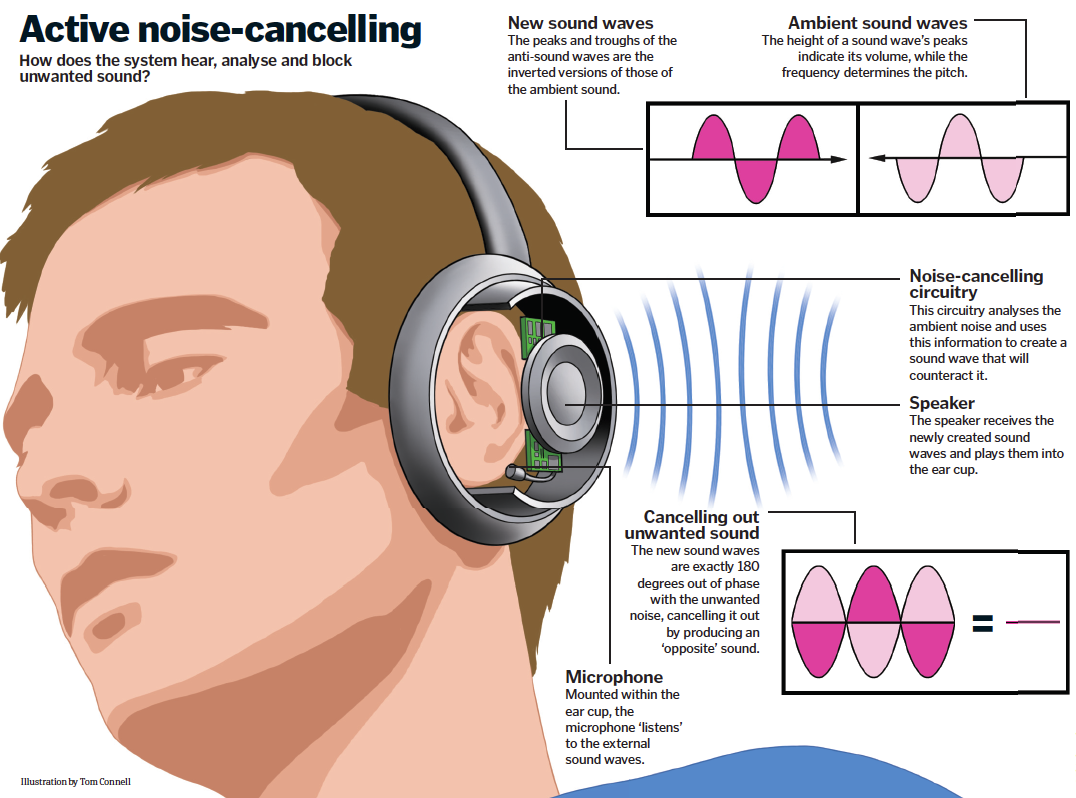If you are an ardent fan of music and travel across cities on busy commuter trains, then you would recognize Noise cancellation headphones as a boon. What started as a search to fulfill a necessity has now turned into a billion-dollar industry.
Noise-canceling headphones are convenient to minimize noisy environments and allow you to enjoy your favorite playlist without distraction- yes, even when you are in busy public places without affecting the quality of the sound you are listening to.
Related: Best Noise Cancelling Headphones for Dogs – 6 Options in 2023
Table Of Contents
- 1 How Were Noise Cancelling Headphones Developed?
- 2 The Science Behind Noise Cancellation
- 3 Types Of Noise Cancelling Headphones
- 4 Noise Cancelling Headphones Components
- 5 Highlights
- 6 How To Select Your Noise Cancellation Headphones?
- 7 Is it worth buying noise-cancelling headphones?
- 8 Can you hear yourself with noise-cancelling headphones?
How Were Noise Cancelling Headphones Developed?
The headphones were introduced by Amar Bose in the late nineteen seventies, who went on to become the founding father of Bose Corporation.
He had a pair of airline headphones that get shipped to us as mere mortals in the cattle class with low-quality wires, but he could not enjoy his favorite music due to the loud noise from the plane engines.
From there, he thought about it and decided to develop noise-canceling headphones. Ten years after the airline incident, noise-canceling headphones were available in the market and became a game changer!
The Science Behind Noise Cancellation
So, How do Noise Cancellation Headphones work? They work by allowing only the intended sound and blocking the rest out. Before you learn how the headphones mechanism works, it is essential to know the science behind it by first understanding how sound waves function.
When mechanical vibration occurs, rarefactions and compressions are produced, which spread to form sound waves. The sound waves are longitudinal waves parallel to the direction of the medium of vibration.
Types Of Noise Cancelling Headphones
When it comes to noise-canceling headphones, you have two types to select from-Passive Active headphones. Below are their differences.
• Passive
They work by muffling the noise, from outside to lessen the noise’ interference with your music. They prevent the noise from getting into your ears by using ear cushions formed by some layers of foam.
Different manufacturers use various foams to protect your ears against noise, so when purchasing, consider the type of foam used. The most preferred type is the circum-aural type as they are specially made to reduce noise and increase the noise-reducing options. T
Their foam layers are high-density, making them bulkier than other noise-cancelling headphones.
The effectiveness of passive noise cancelling headphones is high. They have been tested thoroughly and proven to block any external sound waves. The cost of purchasing these headphones is usually very cheap and affordable, and you will enjoy all the features you need to block noise.
Passive noise cancelling headphones can reduce noise by up to 15 to 20 decibels.
• Active
These headphones are like an advanced version of passive headphones. They have all the features that passive headphones offer, but their main feature is the phase cancelling technology. which blocks even the lowest of the low-frequency sound waves
They usually come with a microphone that picks the unwanted noise from outside, which the circum-aural cushions cannot block, and eliminates them pretty efficiently.
A phase-canceling circuit carries out all this within the headphones that assesses the unwanted noise’s intensity and frequency to help block it. The noise cancellation process is then manipulated electronically, whereby the incoming noise is 180 degrees out of phase.
Typically, the speakers found in the active headphones have anti-noise features, and they eliminate any noise that has already entered the device. This feature results in the audio or music you listen to becomes audible and clear.
Source: https://www.howitworksdaily.com/how-do-noise-cancelling-headphones-work/
Noise Cancelling Headphones Components
Microphone
The microphone is located inside the ear cup. The main functions of the microphone are to pick up the noise from outside that the circum-aural cushions cannot block out.
Noise Cancelling Circuit System
The ear cups have electronic features that help the microphone to block the noise by detecting the frequency of the unwanted noise. This circuit system also analyzes the intensity of the external and artificially generated noise, allowing them to meet and cancel each other.
Battery
As with any advanced electronic circuitry, noise cancellation requires adequate power to function effectively. A battery with a long life is a sufficient source of power for the headphones. This is the least of the worries if you buy the headphones, as most these days come with rechargeable built-in batteries anyways!
Highlights
The components we discussed earlier are necessary for the noise cancellation process by the headphones, which can, believe it or not, can reduce up to 70 percent of external noise, making the music or audio that you enjoy very enjoyable even in the noisiest of environments like airlines and public places/
Some people have argued that while noise cancelling headphones reduce external noise, the audio quality is usually compromised. Other people have reported that the ear cups help eliminate the air pressure as air does not enter the speakers in the earphones.
However, the disadvantages reported cannot outdo users’ benefits from these headphones. They have become a necessity among most people who want to enjoy music in places with a lot of noise.
Also, if you are anything like me, the headphones are advantageous when traveling as you will not get annoyed by the noise buzzing through. One word of caution, though! When driving or walking along the road, you should be careful as you will not hear any sound of an oncoming vehicle.
Also, in public, you should be careful as the noise cancelling features increase your focus on the music/audio and may result in losing that last bus home you so desperately wanted to catch!
How To Select Your Noise Cancellation Headphones?
Now that you understand the differences between passive and active noise cancelling headphones, you should choose the best one. In most cases, passive headphones are usually advantageous.
Irrespective of your type, hundreds of models exist in the market. Here are a few tips to help you select that noise cancellation headset you couldn’t wait for so long…
The Cost
Before you go purchasing, make sure that you have a set budget. Due to their technical features, noise cancelling headphones can be a bit pricey. For an average user who commutes daily to London on packed trains and tubes for over two hours each way, like me, you probably are looking at a moderate use of headphones.
If this is your first dip into the noise cancellation world, try to dip your toes with a standard brand before spending that hard-earned cash! Not everyone likes this feature on their headsets, so remember to take it nice and slow.
One tip that has always worked for me sit to keep an eye out on coupon and deal sites for your favorite brand and jump on sales when they arrive. I get it that if you are an impulsive soul and can’t wait but more often than not if you wait for sales, you will end up with reasonable prices from a reputed manufacturer.
Due to the nature of the device and its usage, most noise-cancelling headphones are made of premium, high-quality materials that are durable and last very long.
Warranty
When you are out and about and purchasing the noise-cancelling headphones, check if the manufacturer offers warranty services. You are probably better off with another brand if they do not offer it.
If they provide a warranty, check the period and their terms, as most offer a minimum of two years on factory-build so you are pretty much covered.
Reviews
It would be best to research the reviews from different users and industry-standard reputable review sites like ours. The reviews will help you to know the advantages and disadvantages of using those noise-cancelling headphones.
Features
Whatever price or model you choose, noise cancelling headphones should and will have all the features discussed above for sound reduction. The headphones’ features will determine the percentage of unwanted sound blocked.
That should be your number one priority- the level of noise blocked. There are also specialized headphones like the models made for drummers, which are also worth considering unless you are hopeless at music like me!
Different brands, types, and noise canceling headphones are available today. You can purchase online or through local shops but remember, research does help. Noise-cancelling headphones are essentials that everyone should have if you like listening to music on the go. They are portable, and you can carry them wherever you go. Happy Noise Free Music!
Is it worth buying noise-cancelling headphones?
You can see that I’ve been trying to answer this question by now, but the correct answer is that it depends. Not everyone will need a set of noise-cancelling headphones as they’re far from an essential purchase these days. However, if you frequently travel on busy public transport or regularly find yourself in noisy environments where your music is drowned out, they can be an excellent purchase.
Can you hear yourself with noise-cancelling headphones?
No, not at all. The point is that they actively cancel out the noise around you, which means everything should be much quieter when it’s on.
What are the best noise-canceling headphones?
You can’t go wrong with Bose or Sony, in our opinion.



